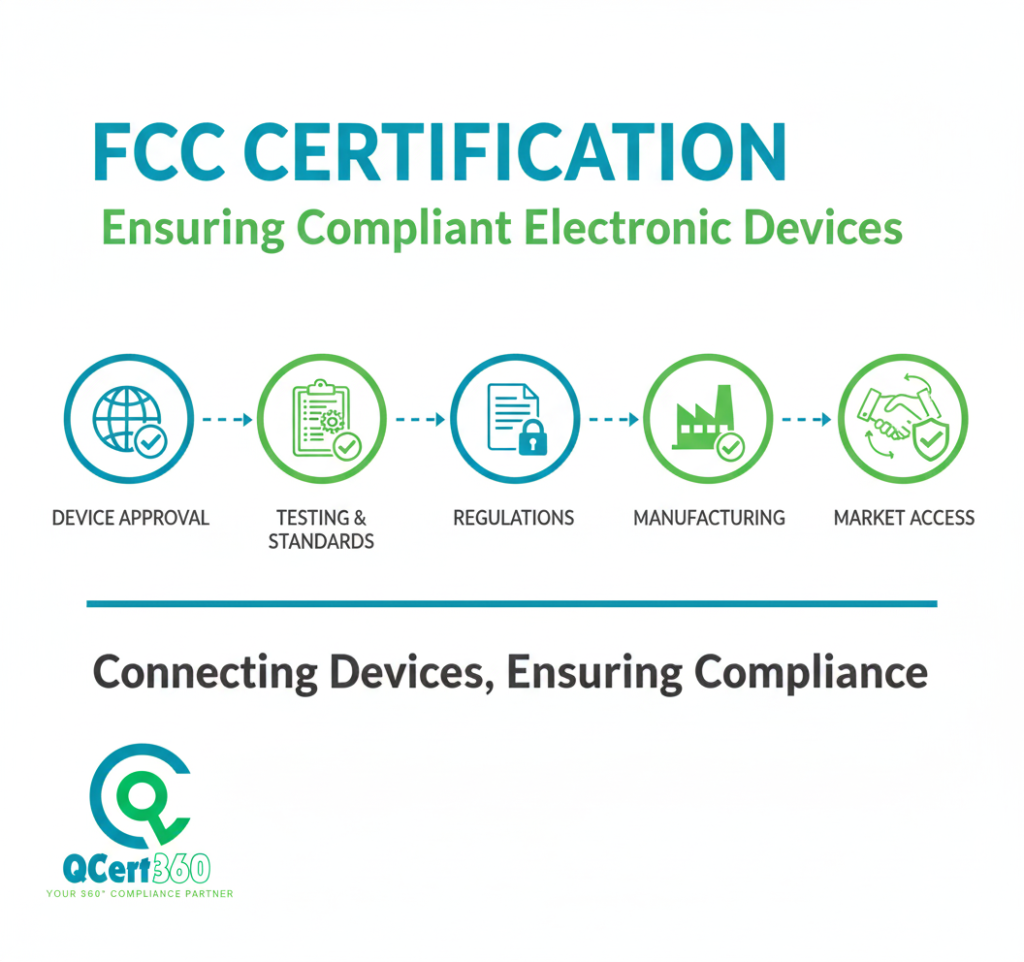FCC Certification
FCC Certification is a mandatory approval issued by the Federal Communications Commission (FCC) in the United States for electronic and radio frequency (RF) devices. It ensures that products like mobile phones, Wi-Fi routers, computers, and other electronic equipment comply with electromagnetic interference (EMI) and radiofrequency exposure limits. The certification process involves testing devices in accredited laboratories to confirm compliance with FCC standards. FCC certification is essential for manufacturers and importers to legally market and sell electronic products in the U.S. It assures consumers of product safety, reliability, and regulatory compliance, while supporting fair competition and reducing risks of harmful interference.
Request a Call Back
Get Free Consultation
Have any Questions?
Mail us Today!
contact@qcert360.com
FCC Certification – Ensuring Compliance and Market Access in the United States
For companies manufacturing or selling electronic products in the United States, FCC certification is mandatory. Issued by the Federal Communications Commission, this certification ensures that electronic and radio-frequency devices operate within regulated limits, preventing interference with other equipment while safeguarding users. Compliance with FCC standards demonstrates a commitment to safety, performance, and regulatory responsibility. Beyond legal necessity, FCC certification builds trust with consumers, importers, and distributors, helping businesses avoid penalties, recalls, and market restrictions. Most importantly, it provides access to the vast U.S. electronics market, strengthening brand reputation and opening opportunities for global trade.
What is FCC Certification?
FCC certification is a mandatory requirement for electronic and radio-frequency devices sold in the United States. It verifies that products comply with electromagnetic compatibility (EMC) and radio frequency (RF) emission standards established by the Federal Communications Commission. Products such as wireless devices, IoT equipment, computers, medical electronics, lighting systems, and industrial machinery all fall under FCC compliance. Manufacturers, importers, and distributors must ensure their products are properly tested and certified before entering the U.S. market. Beyond legal access, FCC certification demonstrates product safety, reduces risks of interference or recalls, and strengthens credibility with customers, regulators, and global trading partners.
Why FCC Certification Matters
FCC compliance goes beyond simply meeting a regulatory requirement—it delivers significant advantages for businesses.
Market Access – FCC approval is mandatory for selling electronic and RF devices in the United States, one of the world’s largest technology markets.
Consumer Safety – Certified products protect users by minimizing interference with other devices, ensuring consistent performance and safe operation.
Regulatory Compliance – Prevents costly fines, recalls, and product bans that could damage both finances and reputation.
Global Trade – FCC standards are recognized internationally, helping companies expand into markets that reference U.S. regulations.
Business Credibility – Certification signals professionalism and reliability, strengthening trust with customers, distributors, and regulatory bodies.

Benefits:
Enhanced Marketability:
Obtaining certification boosts brand visibility and credibility, making products and services more attractive to consumers and increasing market share in global markets.
Consumer Trust & Satisfaction:
Certification assure customers of consistent quality, safety, and reliability, fostering trust, increasing brand loyalty, and ensuring higher levels of customer satisfaction.
Regulatory Compliance
Certification ensure compliance with global standards and regulations, helping businesses avoid legal issues, penalties, and enabling smoother entry into diverse international markets.
Competitive Advantage
Holding certification distinguishes a business from competitors, signaling superior quality and reliability, and positioning the company as an industry leader in the market.
Global Expansion
Certification provide access to new international markets, demonstrating that a business meets global standards, which facilitates expansion and opens doors to new business opportunities worldwide.
Risk Mitigation & Efficiency
Certifications help identify and mitigate risks, streamline operations, and reduce errors or defects, ensuring efficiency and consistency while safeguarding against operational disruptions.
Core Components of FCC Certification
The process of obtaining FCC certification involves several structured steps to ensure devices meet regulatory standards:
- Product Classification – The first step is identifying whether the device falls under FCC rules and determining its specific equipment authorization procedure (e.g., Certification, Supplier’s Declaration of Conformity).
- Testing and Evaluation – Accredited laboratories conduct rigorous electromagnetic compatibility (EMC) and radio frequency (RF) emission tests to verify that the product operates safely without causing harmful interference.
- Technical Documentation – Manufacturers must prepare detailed records, including test reports, schematics, block diagrams, operational descriptions, and user manuals, all of which may be subject to FCC review.
- Labeling and Identification – Certified products must display the FCC ID or compliance label, ensuring traceability and providing assurance of conformity to consumers and regulators.
- Declaration of Conformity – The manufacturer issues a formal statement confirming that the product complies with all applicable FCC requirements.
Benefits of FCC Certification for electronic products
Achieving FCC certification delivers significant business advantages that go beyond regulatory approval:
- Legal Authorization – Certification provides the official clearance needed to sell electronic and RF products in the U.S. market, one of the largest in the world.
- Reduced Risk – Compliance minimizes the chances of costly fines, shipment delays, product recalls, or outright bans that can damage brand reputation.
- Enhanced Credibility – Buyers, distributors, and regulators view FCC-certified products as reliable and trustworthy, improving market acceptance.
- Consumer Confidence – Certification assures customers that devices are safe, tested, and meet performance expectations without causing interference.
- Global Opportunities – Since many international markets recognize or reference FCC standards, certification strengthens positioning in global supply chains and tender opportunities.
Who Needs to obtain FCC Certification?
FCC certification applies to a broad range of products that emit radio frequencies or connect wirelessly, making it a critical requirement for many industries.
- Wireless Devices – From smartphones and Wi-Fi routers to Bluetooth headphones and wearables, all wireless communication devices must comply to prevent interference.
- Computers and IT Equipment – Laptops, servers, desktops, and peripherals like keyboards or printers are tested to ensure safe electromagnetic compatibility.
- IoT Devices – Smart home appliances, connected vehicles, and industrial IoT systems must meet FCC rules to function safely in networked environments.
- Medical Electronics – Devices such as patient monitoring systems, diagnostic instruments, and wireless medical tools require certification to ensure reliability and patient safety.
- Lighting and Industrial Products – LED lighting, control systems, automation equipment, and RF-enabled machinery must also meet compliance standards.
In short, any product that transmits, receives, or is powered by radio frequencies must undergo FCC certification before being sold in the U.S.
Ongoing Compliance Under FCC
Maintaining FCC certification is an ongoing responsibility, not a one-time achievement. Organizations must ensure that every product continues to meet electromagnetic compatibility (EMC) and radio frequency (RF) standards throughout its lifecycle.
- Design and Component Changes – Any modifications to hardware, software, or materials require reassessment to confirm continued compliance.
- Updated Technical Documentation – Test reports, schematics, and user manuals must be kept current and readily available for inspections or audits.
- Regular Testing and Audits – Periodic checks ensure that products still meet FCC standards and function safely in real-world conditions.
- Staff Training – Teams should be educated on FCC labeling, compliance obligations, and best practices for handling updates.
- Regulatory Monitoring – Staying informed on new rules, directives, or amendments is crucial to avoid non-compliance risks.
By embedding these practices into operations, companies safeguard long-term U.S. market access, strengthen consumer trust, and uphold business credibility.
Conclusion: Qcert360 Expertise in FCC certification
Achieving FCC certification is a complex process that requires technical knowledge, accredited testing, and meticulous documentation. Compliance is not just about ticking regulatory boxes—it ensures that your electronic products meet U.S. standards for electromagnetic compatibility, radio frequency emissions, and user safety.
At Qcert360, we guide businesses through every stage of FCC certification. Our services include product classification, coordination with accredited laboratories, preparation of technical documentation, labeling guidance, and audit readiness. We help ensure that your devices—from wireless gadgets and IoT products to industrial electronics and medical equipment—meet all applicable FCC requirements efficiently and accurately.
Partnering with Qcert360 provides more than certification—it gives you a trusted advisor who helps safeguard market access, minimize compliance risks, and strengthen consumer confidence. Our expertise ensures that your products consistently meet regulatory standards, allowing you to focus on innovation and growth.
With Qcert360, manufacturers and suppliers can confidently navigate U.S. regulatory requirements, enter the market smoothly, and enhance their brand reputation. By achieving FCC certification with our guidance, your organization gains credibility, operational assurance, and expanded opportunities in both domestic and global electronics markets.
Sectors & Industries we serve
Our Services
ISO Standards
- ISO 9001 Certification
- ISO 14001 Certification
- ISO 45001 Certification
- ISO 22000 Certification
- ISO 17025 Certification
- ISO 27001 Certification
- ISO 13485 Certification
- ISO 20000-1 Certification
- ISO 41001 Certification
- ISO 22716 Certification
- ISO 50001 Certification
- ISO 22301 Certification
- ISO 29993 Certification
Product Certifications
Other international standards
- FSSC 22000 Certification
- HIPAA
- HACCP Certification
- SA 8000 Certification
- GMP Certification
- GDPR
- GDP Certification
- GLP Certification
- Certificate of Conformity


